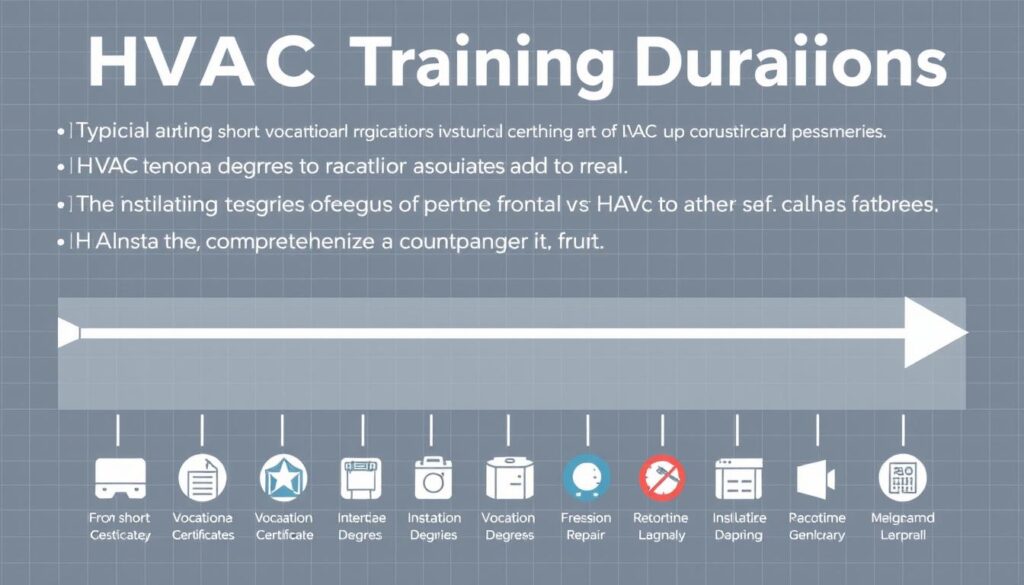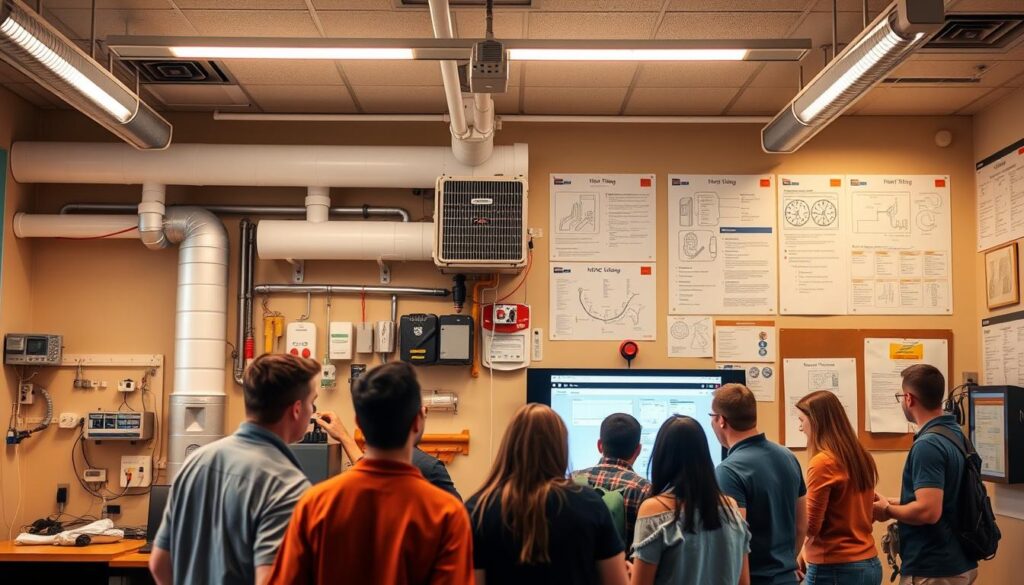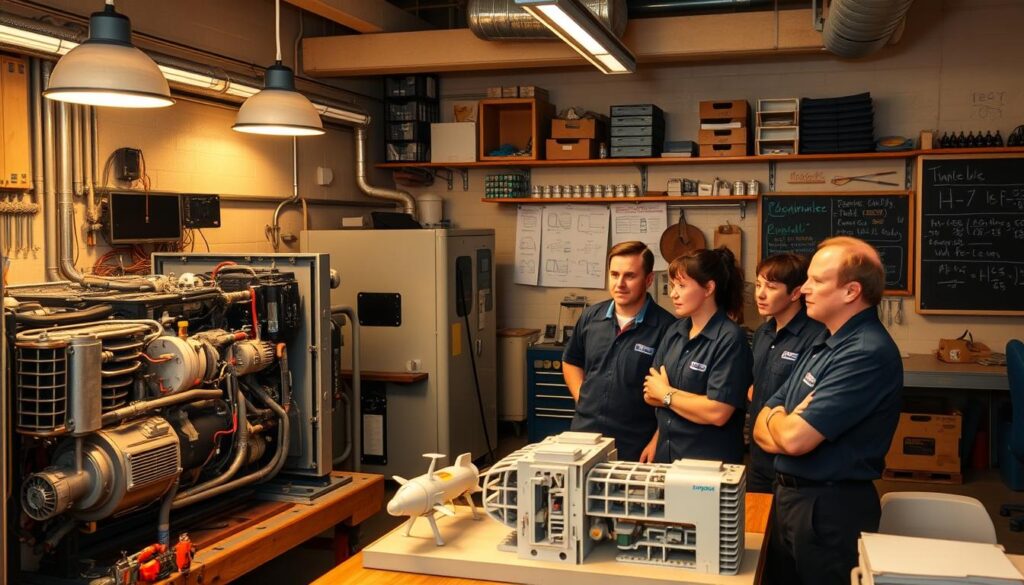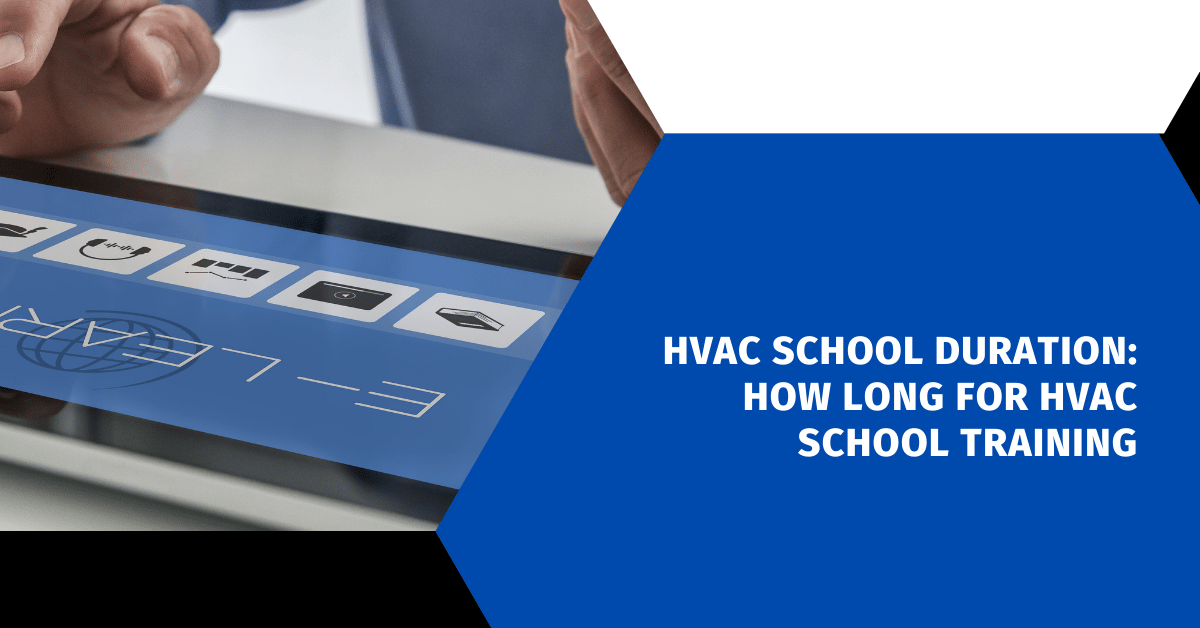Affiliate Disclosure
HVAC Guide Guys is a participant in the Amazon Services LLC Associates Program, an affiliate advertising program designed to provide a means for sites to earn advertising fees by advertising and linking to Amazon.
How Long for HVAC School Training? Are you ready to start a career that keeps America comfortable? How long does it take to become a professional HVAC technician? These technicians fix, install, and maintain heating and cooling systems.

The time it takes to become an HVAC pro depends on your education choice. You can get a certificate in 6 months or an associate degree in 2 years. Your choice will decide how fast you start your HVAC career.
The demand for HVAC service technicians is growing fast. By 2031, it’s expected to rise by 5%. This means your career choice is very timely. The industry needs skilled people to work on both home and business climate systems.
Key Takeaways
- HVAC training programs range from 6 months to 2 years
- Employment growth for HVAC technicians is strong
- Multiple educational paths are available
- Certification is typically required
- Hands-on training is key for success
Table of Contents
Overview of HVAC Training Programs
Exploring HVAC education shows a wide range of options for those starting their careers. You can choose from different training lengths to fit your goals and life situation.
The HVAC field offers many educational paths to build your technical skills. Knowing these options helps you pick the best program for your future.
Types of HVAC Educational Paths
- Trade School Certificates (6-12 months)
- Associate Degree Programs (18-24 months)
- Apprenticeship Programs (2-5 years)
- Specialized Certification Programs
Career Outlook and Industry Demand
The HVAC industry is growing fast, with lots of job openings across the country. The length of your HVAC classes affects your job readiness and skills.
| Program Type | Duration | Job Market Position |
|---|---|---|
| Certificate Program | 6-12 months | Entry-level positions |
| Associate Degree | 18-24 months | Advanced technical roles |
| Apprenticeship | 2-5 years | Comprehensive expertise |
Salary Range for HVAC Technicians
Investing in HVAC training can lead to good pay. Skills and training level directly affect your earning power in both homes and businesses.
“The right HVAC training opens doors to a stable and rewarding career path.” – Industry Expert
Choosing the right HVAC program depends on your goals, time, and money. Each path has its own benefits for a successful technical career.
Explore Our HVAC Shop
Looking for top-rated HVAC tools, parts, and accessories? Visit our shop and find the perfect solution for your needs.
Visit the ShopHow Long for HVAC School: Program Duration Options
Knowing how long HVAC school takes is key when planning your career. The time needed for HVAC school varies, giving you choices to fit your learning style and career goals.
HVAC training programs vary in length. You can find options from short certificate programs to longer educational paths:
- Certificate Programs: 6-12 months
- Trade School Programs: 7-24 months
- Associate Degree Programs: 18-36 months
- Apprenticeship Programs: 3-5 years
At places like Apex Technical School, you can finish your HVAC degree in just 7 months. These fast programs include about 900 hours of class and hands-on training. They give you a solid education.
Quick training doesn’t mean compromising quality – these programs are designed to prepare you thoroughly for the HVAC industry.
Your choice depends on several things. These include your current job, money, and career goals. Some like short certificate programs for quick entry. Others choose longer associate degree paths for more technical skills.
It’s important to pick a program that matches your career dreams. Make sure it gives you strong, practical skills for the HVAC field.
Certificate Programs: Fast-Track to HVAC Career
If you want to start your HVAC career fast, certificate programs are a great choice. They offer a quick way to learn the skills you need. You can get into the HVAC industry quickly with these focused training options.
Certificate programs in HVAC technology last from six months to a year. They are perfect for those who want to join the technical workforce quickly.
Program Components and Curriculum
An HVAC certificate program teaches you the basics fast. You’ll learn about:
- Basic refrigeration systems
- HVACR electrical fundamentals
- Load calculation techniques
- Residential and commercial system operations
- EPA certification preparation
Time Investment for Certification
Certificate programs usually take 24 to 36 credit hours. Important courses include:
| Course | Credits | Focus Area |
|---|---|---|
| Basic Refrigeration Systems | 4 | Core Technical Knowledge |
| HVACR Electricity | 4 | Electrical Systems |
| EPA Certification Preparation | 2 | Professional Credentials |
| Heating and Ventilation | 8 | System Design |
Entry-Level Career Opportunities
After finishing a certificate program, you can get into entry-level HVAC jobs. The U.S. Bureau of Labor Statistics says HVACR technician jobs will grow 5% by 2033. The median salary is $53,920.
These programs give you a strong start in your technical career. They teach you practical skills and help you get professional credentials. This is great for success in the HVAC field.
Explore Our HVAC Shop
Looking for top-rated HVAC tools, parts, and accessories? Visit our shop and find the perfect solution for your needs.
Visit the ShopAssociate Degree Programs in HVAC Technology

An associate degree in HVAC technology is a great start for your career in heating, ventilation, and air conditioning. It usually takes two years to complete. This program gives you more technical skills and knowledge than certificate programs.
For an Associate of Applied Science (A.A.S.) degree, you need 66 total credits over four semesters. This program gets you ready for more challenging HVAC jobs. It helps you stand out in the job market.
- Program Duration: 4 semesters
- Total Credits Required: 66 credits
- Hands-on Internship Training: Over 400 hours
- E.P.A. Refrigerant Usage Certification: Included in curriculum
The hvac degree timeline is flexible. You can choose to study full-time or part-time. This makes it easier to keep up with work and personal life. Stackable credential models let you move credits between programs, adding to your flexibility.
“An associate degree in HVAC technology opens doors to numerous career opportunities in a growing industry.” – HVAC Industry Expert
After graduating, you can earn a good salary. HVAC technicians start at about $48,630 a year. The program also prepares you for future career growth and specialization in HVAC.
Explore Our HVAC Shop
Looking for top-rated HVAC tools, parts, and accessories? Visit our shop and find the perfect solution for your needs.
Visit the ShopApprenticeship Programs: Learning While Earning
HVAC apprenticeship programs are a great way to start your career in heating, ventilation, and air conditioning. They mix classroom learning with real-world practice. This lets you earn money while you learn.
Structure of HVAC Apprenticeships
HVAC apprenticeships are tough but rewarding. They last 4 to 5 years. You’ll learn a lot of practical skills during this time.
- 144-576 classroom instruction hours annually
- 8,000 hours of on-the-job training
- Progressive skill development
Duration Requirements
The length of HVAC apprenticeships varies. Most last 4 to 5 years. This lets you become very skilled in your field.
| Program Feature | Details |
|---|---|
| Average Program Length | 4-5 years |
| Classroom Hours | 144-576 hours per year |
| On-Job Training Hours | 8,000 total hours |
Benefits of Hands-on Training
Apprenticeship programs have many benefits:
- Earn while learning – Start getting paid during training
- 90% employment retention after program completion
- Potential lifetime earning advantage of $300,000+
- Direct industry experience and networking opportunities
Choosing an apprenticeship means investing in a strong career in HVAC. It offers great growth opportunities.
Factors Affecting HVAC Training Duration

Your HVAC education length can vary a lot. This depends on several important factors. Knowing these helps you plan your career and understand how long HVAC programs last.
Several key aspects influence the duration of your HVAC classes:
- Prior Experience: Having technical background or related work experience can shorten your training time
- Individual Learning Pace
- Program Structure and Intensity
- Study Commitment (Full-time vs Part-time)
The typical HVAC classes length is between 6 months and 2 years. This depends on the educational path you choose. Certificate programs usually take 6-12 months. Associate degree programs might take about 2 years.
External factors that impact HVAC education length include:
- State Licensing Requirements
- Industry Certification Needs
- Practical Training Opportunities
- Specialized Skill Development
Your personal commitment and aptitude are key in finishing HVAC training quickly. Students with strong mechanical skills and good study habits often finish faster.
Continuous learning is vital in the dynamic HVAC industry. Technological advancements constantly change what professionals need to know.
While program duration is important, the quality of education and practical skills you gain are more important. These are key to your success as an HVAC technician.
Explore Our HVAC Shop
Looking for top-rated HVAC tools, parts, and accessories? Visit our shop and find the perfect solution for your needs.
Visit the ShopSkills and Knowledge Gained During Training
Your HVAC training journey teaches you a lot of technical skills and practical knowledge. These skills are key for success in the heating, ventilation, and air conditioning industry. The length of your training may vary, but the skills you learn are always valuable.
Technical Competencies
During your training, you’ll learn important technical skills. These skills are the base of your career. You’ll learn to:
- Read and understand construction and industrial blueprints
- Know how to work with complex HVAC systems
- Install electrical systems correctly
- Use advanced troubleshooting methods
- Do precise equipment maintenance
Industry-Specific Training
Your training will also teach you specialized knowledge. This knowledge makes you stand out in the industry. You’ll learn about:
- How to make systems more energy efficient
- Using green technology
- Working with building automation systems
- Advanced refrigeration methods
- Modern climate control systems
Safety Protocols and Standards
Safety is a big part of HVAC training. You’ll learn about important safety rules, including:
- How to handle tools and equipment safely
- Managing chemical safety
- Using personal protective equipment
- How to assess and reduce risks
- Following industry safety rules
By finishing your HVAC training, you’ll be ready to face complex challenges in the heating and cooling world.
Conclusion
Choosing the right training program is key to becoming an HVAC technician. The length of time you spend in school depends on your goals and personal situation. You can pick from 9-month certificate programs to 2-year associate degrees, finding the best fit for your career.
The time it takes to get certified varies, but each path has its benefits. With a 9% growth rate in jobs, the future looks bright. Your education can lead to a salary of $57,300, with chances to earn more with special skills.
When planning your HVAC degree, think about your career goals. Look at hands-on training, certification needs, and new trends in the field. The best technicians keep learning and stay up-to-date with new HVAC technologies.
Starting your HVAC education is just the first step in a fulfilling career. Whether you go for a certificate, associate degree, or apprenticeship, keep learning. This will be your biggest asset in this changing field.

